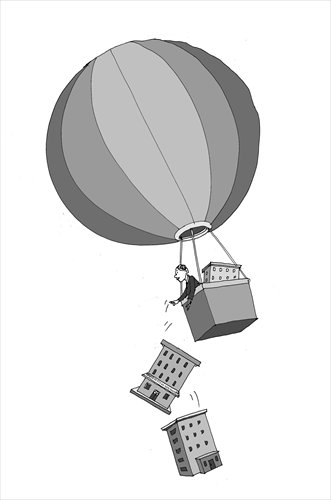HOME >> BUSINESS
Property destocking should be based on market rules
By Yu Fenghui Source:Global Times Published: 2016-1-17 22:48:01

Illustration: Luo Xuan/GT
After China's Central Economic Work Conference last month listed property destocking as one of the country's five main structural reforms in 2016, public attention has been increasingly focused on the issue. Dissolving inventories of unsold property is a pressing and necessary task, as it could help boost economic growth and resolve potential economic and financial risks.Many third- and fourth-tier cities have blindly followed the development model of first- and second-tier cities. This, coupled with the expansion by large property developers into lower-tier cities, led to both a rise in prices and a severe oversupply of residential properties.
For properties that rely heavily on loans, especially bank loans, if they remain in the stock backlog for too long they can trigger financial risks such as bad debts in the banking system.
To successfully accomplish the goal of destocking, the process must be accompanied by effective measures. There are various suggestions for solving the destocking problem, many of which are undeniably instructive. But I have my doubts about some of the suggestions, two in particular.
One suggestion was for the government to buy unsold property in cities rather than starting new affordable housing projects. The other was to dissolve inventories by encouraging migrant workers and farmers to purchase homes.
If the government was to purchase housing to use it as part of the affordable housing program, it would mainly have the effect of boosting the property market, and developers would be the biggest beneficiaries, as public funds would be used to pay them. Such purchases would also give the government officials who are in charge of these practices unprecedented power to decide which property to buy and at what price, and there is a serious risk that this could lead to corruption.
We should learn from the hard lesson of insider trading and severe corruption by government officials and senior executives at securities companies that was exposed following the stock market rescue last year.
It would also be futile to try to persuade farmers and migrant workers to buy up the unsold properties, as they simply can't afford the excessively high prices. Many of these people have average annual incomes below 10,000 yuan ($1,543).
Even though the government could come up with various forms of subsidies and tax cuts, the total effect would not be enough to make up the difference between high property prices and farmers' limited purchasing power. The farmers and migrant workers would have to raise loans that they would then be paying back for the rest of their lifetime or even longer.
One thing we have to clarify is that the property destocking effort will require marketized methods rather than administrative measures. Blind interventions by the government in the past have contributed to the current situation in the Chinese property market, so the government should avoid repeating the same mistakes.
In light of the relationship between supply and demand, the best solution for destocking is cutting property prices. Some might say that would mean property developers losing money. But this would be quite natural as it is very difficult to always gain profits.
And developers could hold on to their stock if they don't want to lose money, but only if they can pay back their loans.
Administrative measures that are intended to support property prices are futile. The only way to digest property inventories in China is by sticking to market rules and reducing property prices.
The author is a financial commentator. bizopinion@globaltimes.com.cn
Posted in: Expert assessment